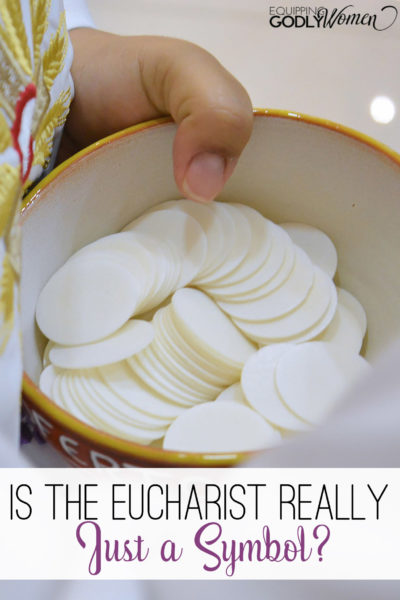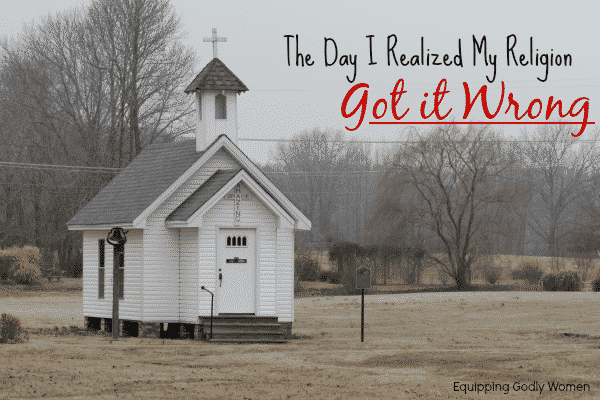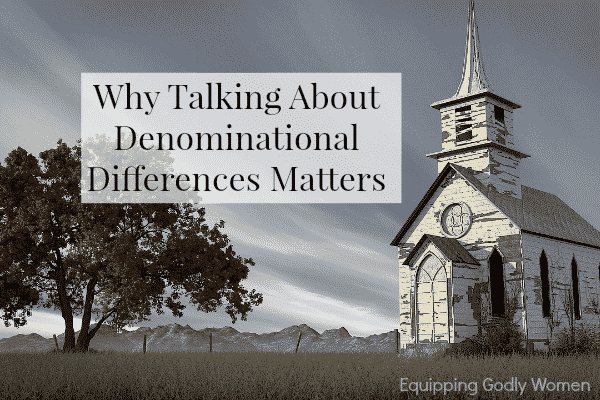Is the Eucharist Really Just a Symbol? 5 Convincing Proofs that Say that It’s Not
This post is post 3 in a series entitled Letting God Lead: My Journey Through Protestant and Catholic Beliefs. While you certainly can read this post by itself, I highly encourage you to check out the rest of the series as well. Find more about this series and a list of all of posts here. This post contains affiliate links.
The first blow to my old Protestant belief system was a big one, and one I wasn’t expecting. As I was reading along in the book Surprised by Truth, one section jumped right off the page and stopped me right in my tracks:
“Writing to the church at Smyrna, a major Christian center in Asia Minor, Ignatius condemned heretics who denied that Christ had an actual physical body… To refute them, Ignatius wrote “They [the heretics] even absent themselves from the Eucharist and public prayers [cf. Acts 2:42], because they will not admit that the Eucharist is the flesh of our Savior Jesus Christ which suffered for our sins and which the Father in his goodness afterwards raised up again.”
Now, I’d had Catholics tell me that Jesus’s words “This is my body” and “This is my blood” were literal before, but not one of them could ever give me a single solid reason why I should believe it other than because that’s what they *thought* the words meant. Well… that’s not a very good argument. They thought it meant one thing–I thought it meant another. So… not exactly convincing.
You see, Jesus spoke in parables all the time, I reasoned. Therefore, the most logical conclusion was that this was simply another metaphor too. Just like how he said he was the vine and the door. Metaphors.
Except that once I started researching further, I started to discover things I never knew before. And in the course of my research, I found five very convincing reasons why the Eucharist must be none other than the real body and blood. Maybe they’ll convince you too?
[thrive_leads id=’23166′]
1. The Early Church Believed It
I’ve always thought that if anyone had a chance of getting it right, it was the early church. After all, they were the ones who heard it straight from the source.
Take Ignatius, for example (author of the quote above). Ignatius was the first bishop of Antioch (the city were Jesus’ followers were first called Christians) and he studied under the apostle John (the one that wrote the Gospel of John). I’d say he would probably be a pretty reliable source! And yet, here he was writing about the real presence of the Eucharist as though it were common knowledge only 10 to 15 years after the apostle John’s death! That’s not a lot of time to get the message mixed up.
You don’t just have to take his word for it though. Apparently all of the early church fathers believed in the real presence of the Lord in the Eucharist. In fact, the doctrine was never seriously questioned until the 11th century. Hmmm…. Did not know that.
Given the choice between what my pastor says today and the beliefs of the first (and second, and third…) century church… well that’s a pretty strong argument. And it’s not the only one.
2. The Jews Couldn’t Accept It
Another thing I never realized: The “this is my body… this is my blood” passage you read in Luke… it isn’t the only time when Jesus talks about being the bread of life.
I won’t retype the entire passage here, but I strongly encourage you to look up and read John 6:22-71 (link for your convenience). In it, Jesus has a lengthy discussion with the Jews in which he compares the manna the Israelites ate in the desert and the bread of eternal life that God offers today. The Jews are understandably very confused, but Jesus just keeps repeating the same thing over and over again.
“Jesus said to them, “I am the bread of life; whoever comes to me will never hunger, and whoever believes in me will never thirst.” –John 6:33
“I am the bread of life. Your ancestors ate the manna in the desert, but they died; this is the bread that comes down from heaven so that one may eat it and not die. I am the living bread that came down from heaven; whoever eats this bread will live forever; and the bread that I will give is my flesh for the life of the world.” –John 6:48-51
“Jesus said to them, ‘Amen, amen, I say to you, unless you eat the flesh of the Son of Man and drink his blood, you do not have life within you. Whoever eats my flesh and drinks my blood has eternal life, and I will raise him on the last day. For my flesh is true food, and my blood is true drink. Whoever eats my flesh and drinks my blood remains in me and I in him.'” –John 6:53-56.
But where it REALLY gets interesting is the Jews’ reaction after the fact. In verse 66, it records that “many [of] his disciples returned to their former way of life and no longer accompanied him.” Would they leave over a mere symbol? Seems doubtful. So I’m guessing that the Jewish people knew Jesus was being literal, even if they didn’t really understand it.
3. Jesus’s Use of the Greek Word “Trogon”
While having the ability to read the Bible in English is wonderful; it does come with some limitations. One of which is the fact that some things are lost in translation.
What you DON’T notice when reading the passage above is that when Jesus talks about eating, he is actually using two separate verbs. At first, he uses the Greek word “phagon” which is the normal Greek word for “to eat.” Part way through the passage, however, he suddenly switches to the word “trogon,” which literally means to crunch or gnaw.
Jesus wasn’t telling them to “partake” or “consume.” He was saying they literally had to crunch, gnaw or chew. (Kind of hard to “crunch” on a symbol… but you can try!) Furthermore, the tense of the word “trogon” implies that this is an action that will take place continuously over time–not as a one-time event.
4. The Eucharist Comes with a Strong Warning
Fast forward to 1 Corinthians, and you’ll find this strongly worded passage:
“Therefore, whoever eats the bread or drinks the cup of the Lord unworthily will have to answer for the body and blood of the Lord… For anyone who eats and drinks without discerning the body, eats and drinks judgement on himself. That is why many among you are ill and infirm, and a considerable number are dying.” –1 Corinthians 11:27, 29-30
Since when do mere symbols come with death penalties?
5. Eucharistic Miracles
Before a few weeks ago, I never even knew there was such a thing as Eucharistic miracles. At first I was very skeptical–because how could you even prove something like this? But from what I can tell at least SOME of the miracles are VERY well documented, scientific and hard to dispute.
This video on the Eucharistic Miracle of Lanciano was my favorite by far. It’s not gross (Some of them are gross! Is it bad to say that?), but it is based on science and facts, and it’s really interesting!!
https://www.youtube.com/watch?v=WeIz4UGI_Zc
Well, there you have it, folks. These aren’t the only reasons–I actually came up with a few more–but if you believe in the Bible and these arguments don’t convince you (or at least cause you to question!), then I don’t know what will!
And now to answer a few of the burning questions you’ve been asking…
What do Catholics Believe About the Holy Eucharist?
In brief:
- The Holy Eucharist is the real body and blood of Jesus Christ in substance, even though still unleavened bread and wine in appearance. This is called “transubstantiation.”
- The elements become the body and blood at the moment when the priest says the words “This is my body” *poof!* and “This is my blood” *poof!*
- They stay the real body and blood as long as they keep their same form. (Once you digest them, they aren’t anymore.)
- Taking the Eucharist offers forgiveness for minor (venial) sins, but not major (mortal) sins. If you are in a state of mortal sin, you should not take the Eucharist until after you go to confession. (Venial/Mortal sins and confession are all topics for another day)
- Jesus is wholly present in equal amounts whether you have one speck of either the unleavened bread OR the wine or if you have a huge helping of both. Same amount of Jesus. (See the video above. That was awesome.)
Why Can’t Protestants Take Part in the Eucharist in a Catholic Church?
At Protestant churches, all Christians are welcome to receive the communion, yet at Catholic churches, only Catholics can. Why is that?
Well, contrary to popular belief, Catholics aren’t discriminating against non-Catholics. Instead, the main reason is that Catholics recognize the Eucharist as the true body and blood, and so they don’t just hand it out to people who don’t believe in it or who might treat it without the reverence and respect that it deserves.
Most Protestants do not believe that the Eucharist is the true body and blood–but only a symbol–and so for a Protestant to take the Eucharist without believing in it would be considered eating without discerning–a very serious offense according to 1 Corinthians 11:29.
Secondly, according to 1 Corinthians 11:16-17, everyone who participates does so in fellowship as part of a whole, unified community. (Catholics do not believe mass happens at individual churches, but that there is ONE mass in Heaven and by receiving on Earth, they are participating in the Heavenly mass with God and the angels.) While Catholics would love to welcome Protestants to the table, it would imply a unity that isn’t really there. (Not my rule. Don’t look at me.)
And finally–not all Catholics can participate in the Eucharist either. In order to partake, Catholics and non-Catholics have to be in a state of grace, have to have gone to confessions since their last mortal sin, and some other stuff. Protestants (and many Catholics) don’t meet these guidelines.
So… for those of you who were asking–these are the official reasons. And you should probably go check out these two articles which can explain it much better than I can:
Who Can Receive Communion on Catholic.com
Why Can’t Non-Catholics Take Communion on CatholicBridge.com
So I hope that helps?
Conclusion
I know that the Eucharist is strange and doesn’t make a lot of sense. But honestly, much of Christianity doesn’t make sense when you look at it from a purely logical perspective. (Three persons in one? There has to be blood shed for our sins?) That’s why it takes faith.
But–thankfully for people who need logic too (like me)–it isn’t JUST faith. There are very convincing reasons to believe in it too. And these are my five.
Discussion time! Do you believe the Eucharist is the real body and blood? Why or why not? What questions or concerns do you have?

Enjoyed this post? Don’t miss the rest of the posts in the series!
The Day I Realized My Religion Got it Wrong
10 Common Catholic Church Myths that Critics Believe
Is the Eucharist Really Just a Symbol?
Who has the Ultimate Authority? A Biblical Look at Sola Scriptura
A Brief Look at the History of Christianity
What All Christians Should Know About Priests, the Pope and Confession
What Do Catholics Really Believe About Mary, Saints and Statues?
Infant Baptism or Believer’s Baptism? Which is Correct?
What is Purgatory? What are Indulgences?
Why Do Catholics….? Honest Answers to Your Burning Questions
Protestant and Catholic Beliefs Series Conclusion
Resources
I’m not asking you to believe because I say so. Please DON’T take my word for it! The purpose of this series is only to share what I’ve learned on my journey in order to inspire you to begin a journey of your own. Here are a few helpful resources to get you started.
*This post contains affiliate links, which means if you make a purchase, I may make a small commission at no additional cost to you. Thank you!
Catechism of the Catholic Church
Surprised by Truth: 11 Converts Give Biblical and Historical Reasons for Becoming Catholic by Patrick Madrid
A Concise History of the Catholic Church by Thomas Bokenkotter
What Catholics Believe about John 6 by Tim Staples
Two Minute Answers to Your Questions About the Catholic Faith by CatholicsComeHome.org
Who Can Receive Communion by Robert H. Brom
Why can’t non-Catholics, Evangelicals and Protestant denominations receive Catholic Communion? by CatholicBridge.com









I am protestant and I find it interesting to look at this Issue of the mass.I am slowly trying to take in what it all means.I see myself as a sinner who Christ drew to himself( John 6:44) and now I have eternal life(john 6:47)The Spirit gave me this life not my flesh (john 6::63) This life I have was granted or enabled by the by the Father.(John 6:65) I have been saved by grace and not my works (Eph.2:8,9) This is what I have come to know and believe and experience.How can the Eucharist help me? Thank you
That’s a great question. According to Catholic belief–receiving the Eucharist allows for the forgiveness of minor sins and it strengthens us so that we can do better in the future. This article lists several benefits according to various Catholics. Whether or not you believe all of them… it’s at least worth looking over. http://www.stmarknc.org/adoration/benefits_of_holy_hour.pdf For me personally, if it really truly is God, don’t you want it?
Thank you my dear friend for supplying us with wonderful passages in the bible to bring life to this very difficult dialogue.
Jesus has given me faith to believe and has gifted me the love of Him in the Holy Eucharist.
It is however difficult to explain to our brothers and sisters in Protestant or other Faiths but you have given great examples and done so lovingly. Thank you thank you.
May God bless you and your family all the days of this life.
Amen.
Thanks, Kristy. It is a very difficult concept!
My true desire is to know God and love Him and understand His Word. I see over and over on the question how can one be saved and I see,” Believe on the Lord and you will be saved”, Whoever calls upon the Lord will be saved ” and repent then turn to God and your sins will be wiped out.” I see myself as a sinner that cannot do anything good to earn or play a part in my salvation.That’s why I Christ had to come.” to save His people from there sins” Matt.1:21) not trying but actually saving whom he wants.So that’s where I want to know where the eurcharist comes in, what does it accomplish? What I have always seen is that the life Christ lived and His death on the cross is what was needed to accomplish the redeeming of His elect. Thanks
Brian, I believe the Eucharist imparts additional graces. In other words, it encourages, strengthens and equips us as we live our out Christian walk. And it provides the forgiveness for minor sins as well.
What additional graces would I need? If he has caused me to be born again and have the Holy Spirit as a seal for my salvation I am a new creation. Filled with His Spirit to encourage me strengthen me and equip me. We also have His Word to do this as well. If our sins are covered as far as the east is from the west and He died even for my sins of the future then there is nothing that can separate us from the Love of God, no one can snatch us out of His hands . We have been baught at a price. His death! Which actually accomplished something and not just making salvation a potential thing.I hope to love,learn and share. I pray to be humble and live for His Glory during this short time on earth. Thanks
I believe the graces would allow us to live out our Christian walk more fully and to be more Christ-like. Not to make us any more saved then we are already, but to deepen and strengthen our relationship with Him and our ability to do good things (bc they are the right thing to do and we should want to).
Also–concerning the verse on “nothing can separate us from the love of God” : I looked up that verse again during this series because I remembered hearing it used while I was growing up the same way you used it in your comment. The verse doesn’t say “nothing can separate us from eternal life” or “nothing can separate us from God.” It says nothing can separate us from “the Love of God.” In other words, no matter WHAT we do–even if we completely reject Jesus and refuse to believe, nothing will ever stop him from loving us. The verse isn’t talking about Heaven/eternal life. It’s talking about His unfailing love for us.
And yes, a loving God can send people to Hell. It’s not that He damns them there so much as He doesn’t force us to choose Him. He lets us choose, and for people who choose that they want to be separated from Him, He lets them have that choice.
Brittany,
Thanks for your comments.If we are saved we cannot become any more saved.Is that what I see you wrote? I would agree. When God draws us,grants us,appoints us and chooses us then we are saved.Just look at Rom 8:28 down to 39 He Foreknows us,predestines us,justifies us and glorifies us. What great promises.Who can bring charges against His Chosen?( 33) He interceeds for US(34)so in verse 35 and 39 in context who is the US?from 28 all the down it is for His chosen ones and this is a special love for the ones He will save.This is not about a general love for all people.
God Knows we have wills that are slaves to sin and cannot and will not come to Him. So for some He comes,draws and gives life to whom He wants. (eph.1)
Thanks
GREAT post Brittany!!! Have you ever read books on Eucharistic miracles?! Its amazing.
One of my favorite quotes on the real presence of Jesus in the Eucharist is from Flannery O’Connor: “If its a symbol, then to Hell with it!”
And I love that included the church history…that stuff don’t lie and shows it goes all the way back to the beginning!
Keep up the good work!
Thanks for the encouragement, Patty! 🙂 (And no, I haven’t had the time to read any books yet. Just a few youtube videos)
This post has some very interesting and well reasoned proofs for the Catholic belief in the Real Presence in the Eucharist. However, there is one statement in the “in brief” section that needs some further clarification. At some point during the prayers of consecration, the Holy Spirit acts upon the bread and wine and they become the Body and Blood of our Lord, however it does not happen like a magic act…say the words “This is my Body” and “poof” the bread becomes the Body of Christ; say the words “This is my Blood” and “poof” the wine becomes the blood of our Lord. Many pagans during the early days of the Latin Mass thought just that…in fact, the magic words “hocus pocus” come from the Latin for “This is My Body”…hoc est corpus meum. (Hoc est=hocus; corpus-pocus). The pagans thought the priests were doing magic, but the Eucharist is not magic…it is confected by the Holy Spirit acting through the person of the priest.
You know, of all the things I thought people would say about this article, I was really surprised that the “poofs” were what was really bothering people! (You’re not the first person to mention them 🙂 ) I don’t mean magic as in sorcery or anything evil. I just meant that–as someone who doesn’t really understand how it happens–it just kind of happens–poof/boom/ka-pow! just like that! and it’s different. Yes, because God made it happen, but it’s definitely a mystery! I don’t know how it works!
Hi Brittany,
Don’t you have to have something a little more substantial than accepting things just because the RCC says so? Scripture is the only book of authority for all true Christians,( I do know that the RCC do not believe that the Word of Almighty God is “not enough for all truth”). The bible clearly warns believers about following teachings outside of the “inspired” word of God. Outside of teachings that were taught and written by the Apostles, eye-witnesses of Christ, men who were chosen by God to write down HIS WORD! “But even if we, or an angel from heaven, should preach to you a gospel contrary to what we have preached to you, he is to be accursed! …” Galatians 1:8. The RCC teachings can be seen as being opposed to what is written in God’s word.
Wow. Thanks for the kind, loving and edifying comment. The entire point of this series is that I am NOT accepting things because someone said so–from either side. I wasn’t raised Catholic, so I wasn’t even ever taught their doctrine. I’m simply researching into issues myself, using the Bible as my #1 guide. My findings aren’t based on what anyone taught me or anyone said. They are based on what I am learning through studying the Bible and other books. You are free to disagree, but there’s no need to be rude.
Hello Brittany
I am sorry you felt my comment to be “rude”, that was never my intention. You asked me in your reply email to show “proofs” if I “have any” regarding the Eucharist being symbolic, or more biblically, a memorial. I do have them. However, I wondered if you could first answer one question for which the answer eludes me : What would a true believer (as the bible defines such) benefit from the bread to become Christ’s actual flesh, and the wine to become Christ’s actual blood when partaking in the Lord’s Supper? Have a good day!
Okay, good!
And honestly, I don’t know what the exact benefit is… more grace to live out our Christian life more fully, I think? BUT, I think it’s more a matter of… if you really believe it is Jesus, wouldn’t you want to experience Him? I don’t know.
HI Brittany
Ignore the question of previous comment, I seen it re-reading over your page on Eucharist. Looking forward to reading about ‘mortal’ and ‘venial’ sins and how the RCC explains them.
Hi Brittany
The video on the ‘Eucharistic Miracle of Lanciano’ cannot be substantiated for it to be used as truth. The ‘flesh’ and ‘blood’, may well be what they are said to be, however, it doesn’t prove (if true) whose flesh and whose blood.
I’m wondering if you are searching more for a religion to follow than you are for a true, saving faith and relationship with Jesus. Also, don’t you think a lot more in-depth research, over a considerable amount of time is much needed? For example, you made reference to Ignatius, said to be a disciple of John; did you know that Ignatius was also suspected of parting from the true teachings of the first Apostles, by whom the scriptures were written, and being inspired by God – unlike any other ancient writings? It was not a new thing for ‘disciples’ to turn away from the truth, such happenings are mentioned a number of times in the NT.
With regards to the ‘early church fathers’ one has to remember that they were not inspired by God to write anything, the Apostles were (“for all scripture is God-breathed” [inspired]), written by men chosen by God), they were also actual eye-witnesses of Christ, unlike the ‘early church fathers’ who were not.
If you are searching between protestant and catholic to choose from, I’m not understanding how you claim to be a believer in Christ, as Christ did not come to start a new ‘religion’. As He said “I AM the Way, the Truth and the Life…”
Most of the first church disciples (Acts 2 in particular), were Jewish, the OT & NT are Jewish in their writing and mentality, it is not an ‘aryan book’ and the first believers were not ‘aryan’ as they are often depicted as being. Christ Himself came as a Jew, and at His second coming He will come again as a Jew when He sets His foot on the Mount Olives.
“The doctrine of transubstantiation was formulated in its present form in the Middle Ages by Thomas Aquinas based on Aristotle’s “philosophy of accidents” which was debunked by modern science, chemistry, and physics” (Jacob Prasch, Moriel Ministries). Jacob comes from a Jewish/Catholic background (he’s also from a science background), he is a scholar in Greek, Hebrew and some Arabic, and has been a bible teacher for many years.
The idea of ‘eating’ Christ’s flesh can be shown from scripture that it was not literal (not all scripture is literal and we have to be able to distinguish between literal, and metaphorical, using correct hermeneutics). Christ said He is “..the bread of Life” He told His disciples “…I have food that you do not know about…” “..My food is to do the will of Him Who sent me and to accomplish His work..” John 4:31-34
Christ is the “Word made flesh” we eat His ‘flesh’ means to ‘feed on His word’. There are many other scriptures, outside the scope of this comment, that will confirm what Christ was saying about ‘eating His flesh’.
No, I am not searching for a “religion,” — just the truth. And as I studied several sources (not just Catholic ones), I found enough information to believe that the Eucharist is meant to be the body and the blood. Even if it was someone else’s flesh–that’s still a pretty big miracle! I would think the idea that it would be Jesus’s, like he said, would be more believable than thinking that a wafer just turned into some random Joe Schmo. Plus, how would you explain away all the other reasons I gave? I just don’t see enough evidence for it to be symbolic other than Protestants saying “Well, because we think so.” I’d love to hear more proofs if you have them!
Brittany,
How would you go about understanding Jesus being a vine,a door and other metaphors ? Why do we not look at Him being “bread” the same way? We see in so many places ” believe on me” “call upon me” “come to me” and then it’s followed by ” then you will be saved”This one time sacrifice was atoned by Christ on the cross. Question: Do we ever see the payment of Christ alone never being enough?( He loses none which the Father gives)Which of our sins were not covered?We take communion as He said in “remembrance” not that I see that it’s bringing in more grace than what He has already accomplished. .I too want the truth and will continue to read catholic resources,and others to gain more of a understanding. Thanks so much.
Growing up, I DID see it the same way–as a metaphor. It was only once I began researching and discovered the things I put in this article that I had to change my mind. (The use of the Greek word “Trogon” is pretty darn literal, I’d say. He didn’t say “consume,” he said “chew/gnaw.” And then the Jew’s reaction–I really think it indicates they thought he was being literal. But they couldn’t believe it, so they went away.
How it’s not cannibalism? I honestly don’t know. And “in remembrance” is still accurate, since Catholics aren’t crucifying him again, but only making his sacrifice present. Re: the apostles not thinking it was–there were LOTS of things they didn’t get until after Jesus’s death and resurrection. His teachings were hard, and they were a little dense 🙂 How he did it before his crucifixion: Catholics believe that Jesus works outside of the constraints of time. Time to God isn’t the same as it is to us. Hopefully that helps somewhat?
And as for needing faith + works: keep reading through the series 🙂 I address this in Is Faith Alone Enough? And actually, several of the verses listed at the end of the article concerning faith being enough are addressed in my article. And the ones that aren’t–well, if you read the context around them, there is more to the story 🙂
Hello Brittany
You said you would like more “proof” if I have them concerning actual flesh/blood.
A Response to ‘Five very good Reasons to believe…Eucharist ‘
#1 ‘The Early Church Believed It’ – This is only correct so far as the RCC teach it. Not all RC ‘early church fathers’ agreed with transubstantiation: Tertullian, Origen, Eusebius et al. The first church was as it is found in Acts 2. There, the Apostles/disciples gathered to share in the Lord’s Supper. There is no mention or inference to actual flesh and blood, bread/wine respectively.
Christ instituted the Lord’s Supper: “…take eat; this is My body which is given for you; do this in remembrance of Me..” In the same way He took the cup after they had eaten saying “…this cup which is poured out for you is the new covenant in My blood..” “..take this [cup] and share it among yourselves; for I say to you, I will not drink of the fruit of the vine from now on until the kingdom of God comes..”
To do something in ‘remembrance’ of, is a memorial, a commemoration. Christ never infers it becomes His actual blood and flesh with ingestion, the bread is bread and the wine is wine. Also, at the Last Supper, Christ was still 100% in His human, earthly body, how then did the bread become His body/flesh, the wine His blood?
#2 The reason the Jewish believers turned back after hearing Jesus talking about eating His ‘flesh’ and drinking His ‘blood’, does not prove it was more than symbolic/figurative. The Jews turned back because they knew from their Torah that God forbid the eating of flesh and the drinking of blood, as did also the Apostles. They turned back because they didn’t understand it wasn’t literal. God forbids the drinking of blood, why would He contradict Himself and later say they can drink blood, and that of His own beloved Son? Lev 3:17, 17:10-12; Acts 15:20. It was not just because drinking blood/eating flesh was a pagan practice (which it was), it was forbidden because “….for the life is in the blood” Lev 17:14
#3 Trogon – Phagon The change from the milder form of eating to the stronger form of eating, doesn’t prove the eating flesh/drinking blood is literal. The Jewish leaders didn’t understand when He used the mild form Trogon, Christ went on speaking more intently “…Truly, truly..” which would be today’s equivalent of ‘speaking with an exclamation mark. (the Jewish leaders should have understood the first time, from their own law).
God’s word is many times in OT/NT referred to as ‘food’. eg, Jer 15:16; 1 Cor 3:2; the ‘milk’ ‘meat’ of the Word Heb 5:12; Jesus is the “Word became flesh and dwelt among us..” John 1:1,2, 14. The ‘milk’ of the word is the more fundamental truths, while the meat is more complex, of some deeper order (meat is chewed, gnawed etc). So, the true believer ‘feeds’ on Jesus, the bread of heaven, and grows from babe/milk- adult/meat.
#4 That some believers got sick and some ‘slept’ was a consequence of taking the Lord’s Supper in an unworthy manner, doesn’t show anything regarding real flesh/real blood. Some believers used the Lord’s Supper for indulgence, this may possibly be one consequence. 1 Cor 11:21, 27,29.
#5 ‘Eucharistic Miracle of Lanciano’. No matter what the specimens really are, this ‘miracle’ is totally subjective and has no bearings on proving anything from scripture. Many hoax miracles in Italy & Latin America especially, ie., statues of Mary ‘weeping blood’, all is subjective and to some, it’s hocus pocus (as the RCC themselves proved in some of these cases – can Google it).
“For the Word of God is powerful, stronger than any two-edged sword…”
Very old thread, I know….but am just reading and enjoying it now. 🙂 I want to correct one thing Carrie misunderstood. When we speak of Arians (the early heresy), we are speaking of followers of Bishop Arius, not Aryans, as in white people favored by Nazis. Common mixup.
Oops! That’s one spelling mistake that makes a big difference! 🙂
I see a big thing missing in this article about why there is Holy Communion: Jesus is the Passover Lamb and His sacrifice covers our sins perfectly in God’s commandments from Leviticus. In every Gospel, Jesus and the disciples go to a room for the Passover meal. Traditionally, a place setting is set for the Messiah and the door is left open for Him to be welcomed in. Jesus sits at that place and shuts the door. Then he proceeds to give the Last Supper, which can also be found in Leviticus. As the Jews ate the lamb and remembered their deliverance from Egypt. Jesus gave the disciples the new deliverance from sin. Other people have commented on this (i skimmed a little). Maybe another article about the crossover with Leviticus and the Gospels is in order!! Though not Catholic, I appreciate many Catholic thoughts, traditions, and beliefs and have Incorporated some into my own worship. My husband is also not Catholic and since he is the spiritual head, I won’t pressure him into the religion.
I do not understand why we as Christian Catholics would want to divide ourselves from Christian Protestants over the matter of the Eucharist? I believe we all as Christians have the Great Commission from our Lord and Savior Jesus Christ to “Go into all the world, and preach the gospel to every creature.” Mark 16:15 Jesus said “For God so loved the world that he gave his only begotten Son, that whoever believes in him should not perish, but have everlasting life.” John 3:16 Receiving this gift of salvation and sharing the gospel of salvation seems to be the point of our Christian faith. Sincerely, Mary
The point isn’t to be decisive. Just that the Eucharist is VERY important to Catholics and I imagine they would want Protestants to know what they know too?
Hi Brittany.
I am trying to read the posts I missed during your series as my mom broke her hip while you were writing and I was unable to follow in a timely manner. This post really challenged me…and I am glad! I have teetered back and forth on this issue but I am ashamed to say that I never took the time to research it. I will be committing this to much prayer and will have my husband read the post through too! For years my husband went to both Catholic and Protestant services over this very issue. We really need to decide on where we stand once and for all…thanks for taking the time to research and present the information in a clear way.
Hey, don’t feel bad. Too many people never even bother to research at all. I didn’t for years, and there are still plenty of other things I need to research more too! But you’re researching now, and that’s what matters 🙂
Thank you so much for posting this! Makes a very difficult topic more clear 🙂 I’ve been to the Eucharistic miracle at Lanciano and can speak for its beauty and wonder! God Bless!
You’re welcome! Hope it helped